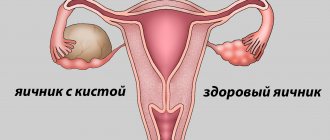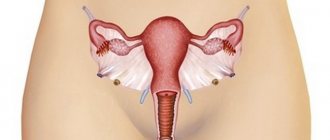When are Indomethacin suppositories prescribed for ovarian cysts? A gynecologist will answer this question. To treat ovarian cysts, medications are most often used, but in difficult situations, surgery is performed. The medication is taken under the supervision of a doctor who controls the medication schedule. These may be non-steroidal anti-inflammatory drugs prescribed simultaneously with contraceptive medications.
When is indomethacin suppositories prescribed for ovarian cysts?
This is necessary to avoid the formation of a new cyst and the beginning of the reduction of existing ones. One of the most effective drugs for treating this disease is Indomethacin, which is available in the form of suspensions and tablets. But it is suppositories that are most effective for ovarian cysts.
Indomethacin suppositories are used as a non-steroidal drug to relieve inflammation and eliminate pain syndromes. Used in gynecology for:
- restoration of the menstrual cycle to eliminate the consequences of hormonal disorders;
- inflammation of the uterine appendages;
- presence of adhesive disease;
- endometriosis;
- uterine fibroids;
- obstruction of the fallopian tubes;
- algodismenorrhea;
- cystitis
Anti-inflammatory vaginal suppositories
Also, for a faster recovery, anti-inflammatory suppositories Longidaza are used for ovarian cysts. Due to this, the functioning of the ovary is restored, which allows it to perform its function again
However, it is important that a full course of drug treatment is also carried out in parallel.
On average, its duration can be about one month, depending on the type of disease. These types of drugs make it possible to provide strong anti-inflammatory effects, due to which the infectious type of illness is quickly eliminated.
Candles with ichthyol
Recently, suppositories containing ichthyol are increasingly being prescribed for inflammation to eliminate ovarian cysts. However, such a remedy cannot be inserted directly into a woman’s vagina because such a suppository leads to severe irritation of the mucous membrane. The uterus itself can suffer significantly from this. Due to their low price, such funds are very accessible to the general public.
These drugs simultaneously have several types of effects, such as anti-inflammatory, antibacterial, and reparative. In this case, the use of such a drug is prescribed only by a doctor. In addition, you need to use gynecological pads, which will make it possible to avoid possible contamination of your underwear.
Suppositories with indomethacin
A significant part of diseases of the gynecological type are accompanied by the presence of severe pain, due to which suppositories are prescribed for cystic ovarian pathology, containing indomethacin. It allows you to relieve existing inflammation.
The amount and duration of taking such a drug will be determined based on the patient’s condition, as well as his speed of recovery. Indomethacin, which is part of the drug, is aimed at stopping the production of substances that have a stimulating effect on the nervous system, thereby also relieving pain.
In addition, during treatment, the synthesis of those substances that participate in the inflammatory process itself begins to stop. Due to the form of release similar to suppositories, the main component will have the fastest possible absorption, due to which relief occurs in the shortest possible time
However, it is important to complete the entire course of treatment in order to completely eliminate all foci of inflammation. The pain itself can be relieved within just 15 minutes
Hormonal suppositories
It is also worth noting that in gynecology, various hormonal drugs are often used to eliminate pathologies in the female genital organs. The fact is that a cyst in the ovary can appear due to an excessive amount of estrogen in the blood, when the second hormone, progesterone, is not enough in the body. That is why, to normalize reproductive function and restore the menstrual cycle, doctors often prescribe the drug Indomethacin.
Hormonal suppositories for vaginal-type ovarian cysts are based on progesterone. With timely initiation of this therapy, relief occurs fairly quickly. And due to the stabilization of hormonal levels, the pathology is significantly reduced in size, and ovulation is normalized. The use of such drugs eliminates the possibility of developing abnormal complications, which may be cyst recurrences.
Treatment with suppositories: will there be an effect?
A pressing issue for many women is whether treatment of ovarian cysts with suppositories alone is sufficient. It’s worth saying right away that any disease must be treated comprehensively, and this pathology is no exception.
In addition to antiviral, anti-inflammatory, and antifungal drugs, hormonal drugs should also be used. They can come in various forms, from tablets to injections. The size and duration of their administration will depend on the severity of the disease, as well as the effectiveness of the medications.
How to use Indomethacin suppositories for ovarian cysts?
Application. Indomethacin suppositories are prescribed to women with ovarian cysts, since the medicine is absorbed quite quickly, relieving very high fever and pain. This drug acts by stopping the formation of substances that strongly excite the nerves and their endings, as a result of which the pain dulls and it ceases to bother patients.
Another direction of action of suppositories is a positive effect on the process of synthesis of substances that cause inflammation and are involved in it.
This eliminates prostaglandins, which cause pain and are the main source of suffering in women. Therefore, suppositories administered rectally have the following effect on the disease:
- eliminate heat and temperature;
- relieve pain;
- help fight inflammation;
- have a broad antiaggregation effect.
It is better to administer suppositories at night before bedtime after the intestines have been emptied. The dosage and regimen of use are prescribed by the doctor depending on the course of the disease, test results and diagnosis. The average course of treatment lasts from 7 to 10 days.
Contraindications and side effects. Indomethacin suppositories should be used very carefully by women suffering from chronic diseases. Namely in cases where:
- Ulcers of the duodenum or stomach are present. Gastritis of varying degrees can also cause anxiety.
- Bleeding in the gastrointestinal tract was observed.
- Suffer from epilepsy.
- With parkinsonism.
- For fractures of various parts of the body.
- The functions of the liver and kidneys are impaired.
- Patients experience an increased degree of hypersensitivity and hypertension.
Special attention is paid to those who are concerned about Crohn's disease, colitis caused by ulcers, and proctitis.
Suppositories reduce side effects because they are administered vaginally. The negative effects of pills are broader and more widespread. Most patients suffering from ovarian cysts tolerate treatment very well, so side effects are associated with the individual characteristics of the body. In particular, these may be factors such as:
- the presence of allergic reactions to the drug that can cause swelling of varying degrees;
- manifestation of drowsiness, which often interferes with work and active life;
- the appearance of headache;
- the occurrence of depression, mood swings may occur;
- the appearance of pain in the cardiac region, increased heart rate, which causes shortness of breath;
- changes in the volume and composition of urine;
- the occurrence of pain of varying degrees in the lower back.
Nausea and vomiting and exacerbation of stomach and intestinal ulcers become more frequent companions for women using indomethacin. Sometimes there is a sharp and sudden pain in the abdomen, or the cornea of the eye changes.
Such effects are possible in several cases:
- When women suffer from these diseases.
- If the daily dose has been exceeded, it must be used every day.
- If the treatment was prescribed independently, without a doctor’s prescription.
Indomethacin suppositories are not recommended for use by pregnant women or while breastfeeding.
Types of cysts and methods of their treatment
The method of therapy is selected individually for each patient and mainly depends on the type of formation on the ovary. In some cases, surgery is the only effective treatment.
Functional
This type includes the following cystic formations:
- Follicular. Formed from a dominant follicle in the absence of an egg release. It is small in size and often present asymptomatically. A functional cyst of the follicular type resolves on its own within 2-3 menstrual cycles. To speed up its disappearance, hormonal agents or vitamins are prescribed.
- Corpus luteum cyst. It appears in place of the corpus luteum in the absence of its regression. Rarely accompanied by pain. Disappears with the onset of menstruation, less often - in several cycles.
To treat them, it is necessary to prescribe hormonal therapy, since their occurrence often indicates a malfunction of the endocrine organs.
Dermoid
Formed even before birth, it is a consequence of intrauterine development disorders. Contains soft and bone tissue, nails, hair. Capable of constantly growing, which can be manifested by heaviness in the lower abdomen and an increase in its size. It can only be removed surgically.
Mucinous
Consists of many chambers filled with thick mucus. Due to their high elasticity, they can grow to enormous sizes. Has a tendency to develop into a malignant formation. Removed during surgery.
Endometrioid
Develops as a result of endometriosis. Contains a brownish liquid with endometrial cells and menstrual blood. If it is detected early, conservative therapy is used, the lack of effectiveness of which requires surgical intervention. The latter is also necessary when the formation reaches a large size.
Paraovarian
Occurs as a result of hormonal changes. A single-chamber formation with thin walls, it has the ability to reach large sizes. If detected early, hormonal therapy is used to treat it. Otherwise, surgical intervention is necessary. With prolonged progression, it can degenerate into a malignant formation.
Hemorrhagic
Occurs with the prolonged presence of functional types of formations. There is bloody contents in its cavity. It is treated under strict monitoring of ovarian cysts by ultrasound using hormonal agents and drugs that improve their resorption. If there is no effectiveness, the treatment tactics change, and surgery may be required.
Polycystic
Polycystic ovary syndrome is a consequence of a hormonal disorder in the body. It is characterized by the appearance of multiple formations of small and medium size. The pathology is eliminated with the help of hormonal therapy.
Retention
It is considered a functional type of education. It is an endometrioid, follicular cyst or corpus luteum cyst. Resolves on its own or under the influence of hormonal therapy. Surgery is rarely used.
Serous ovarian cystoma
A benign tumor consisting of cells identical in structure to the cells of the surface of the ovary. Can reach enormous sizes. If its diameter is small, surgical intervention is used, during which the affected ovary is preserved. When the cyst reaches a large size, it is removed along with the affected organ.
Papillary cystoma
Cystoma with growths on the surface in the form of papillae. It is highly prone to malignancy, so its removal is only possible through surgery. Part of the formation is sent for a biopsy to exclude the presence of cancer cells.
Description of the drug and its use in gynecology
Indomethacin belongs to the group of non-steroidal anti-inflammatory drugs. It comes in the form of suppositories that can be used both rectally and vaginally. One cardboard package contains 10 suppositories, each of which contains 50-100 mg of active ingredient. The drug should be stored for 2 years at temperatures up to 25 degrees.
In gynecology, suppositories are used to relieve pain and relieve inflammation. Indomethacin can be prescribed for large ovarian cysts that cause discomfort to the patient or are accompanied by inflammation in the genitals. The medication is effectively used when body temperature rises due to gynecological and other diseases.
Indomethacin suppositories are auxiliary in the treatment of ovarian cysts and do not affect their elimination in any way.
Evaluation of the effectiveness of local treatment
Vaginal and rectal suppositories are used in gynecology not only for ovarian cysts. Such drugs are used in the treatment of various pathologies - uterine fibroids and endometriosis, inflammatory processes in the pelvic organs. The use of suppositories is practiced in the complex therapy of polycystic ovary syndrome and infertility of various origins
It is only important to choose the right drug in order to achieve maximum results from the treatment.
Reviews from women who have used certain suppositories are varied. Unfortunately, it is not always possible to obtain reliable information about the effectiveness of selected drugs. And if in a antenatal clinic the doctor can track how the prescribed medicine affects the course of the disease, then this cannot be done when self-medicating with herbs. You have to rely on the comments of the women themselves, and this is not a very reliable source of information.
When choosing a specific drug, it is important to consider not only its composition, but also the principle of action, as well as the presence of contraindications. You need to place candles strictly according to the instructions, without exceeding the dosage
If all recommendations are followed, suppositories can be a good tool in the fight against the disease and will help get rid of the problem in a short time.
It happens that the chosen drug does not lead to regression of the cyst. The reasons for failure may be different:
- The cyst exists for a long time and is no longer amenable to conservative treatment;
- The cyst turned out to be not a functional formation, but a true tumor;
- Factors contributing to cyst growth have not been eliminated;
- The drugs were chosen incorrectly.
If there is no effect from conservative therapy within 3 months, surgery is indicated - removal of the formation by laparoscopic or laparotomic access. The choice of surgical treatment method will depend on the size of the cyst, the presence of concomitant pathology and other factors.
Rectally or vaginally
The method of use of the drug is determined by the doctor. For ovarian cysts, Indomethacin suppositories can be administered both rectally and vaginally. It must be remembered that Indomethacin can disrupt the vaginal microflora, so most often suppositories are used rectally.
The medicine has a local effect and is absorbed into the blood through the walls of the vagina or rectum. Due to the close location of the anus and genital tract, the effect of the drug upon rectal and vaginal administration is practically no different.
Release forms and application features
Preparations for the local treatment of ovarian diseases are available in two forms:
- Vaginal suppositories - inserted into the vagina;
- Rectal suppositories - inserted into the rectum through the anus.
The choice of a specific form is often determined by its ease of use. Some products can only be placed in the vagina or rectum, while others allow both options.
Rules for the use of suppositories for ovarian pathology:
- The course of treatment with suppositories is no more than 3 months. During this period, the functional ovarian cyst should resolve. If the formation does not go away, its removal is indicated, and further use of local drugs does not make sense;
- For ovarian endometriosis, the course of therapy can be extended to 6 months (relevant for hormonal drugs);
- The treatment regimen and dosage are determined by the doctor based on the severity of the patient’s condition and the type of cyst. Some products can be used for a long course, others - no more than a week;
- Before starting treatment, you should study the instructions and determine the route of administration of the drug. Vaginal suppositories are inserted deep into the vagina in a lying or semi-sitting position. It is more convenient to insert rectal suppositories into the rectum in a position on the side or on the back, with the knees slightly bent;
- Some local remedies are prohibited for use during pregnancy and lactation, as well as under the age of 18 years. Before starting therapy, you should consult a doctor;
- The effect of using homemade, Chinese and other candles that have not undergone full clinical trials is doubtful. Such drugs are not prescribed in gynecology, but a woman can take them independently at her own peril and risk.
Mode of application
The treatment regimen with Indomethacin for ovarian cysts is individual and is established taking into account the presence of inflammatory processes, the intensity of pain, and the characteristics of the patient’s body. Usually the candle is used once a day, preferably at night. After administration, it is recommended to lie down for about 30 minutes to prevent the drug from leaking out and improve its absorption.
Can be used 2-3 times a day. For this purpose, suppositories with a dosage of 50 mg are used. This allows you to relieve pain throughout the day. For a single administration, it is better to use 100 mg suppositories.
According to women's reviews, Indomethacin suppositories for ovarian cysts are one of the best for relieving pain.
How to insert candles correctly
The effectiveness of the suppositories used directly depends on the correctness of their administration, as well as on compliance with cleanliness standards.
Rectal suppositories must be inserted while lying on your side using your index finger. After the procedure, a horizontal position must be maintained for at least 15–30 minutes. Vaginal suppositories are administered in a similar way with the obligatory lying down for 20 - 25 minutes. To prevent contamination of underwear and clothing, you should additionally use pads. Suppositories administered at night have the optimal effect on the body.
Side effects
The development of side effects from suppositories for ovarian cysts is possible if the dosage is not observed or in combination with other medications. Possible symptoms:
- nausea, vomiting;
- diarrhea or constipation;
- flatulence;
- dizziness;
- increased blood pressure;
- itching, urticaria and other allergic reactions;
- drowsiness;
- noise in ears;
- local internal bleeding.
The likelihood of developing side effects from suppositories is lower than from tablets, because the former have a local effect.
If these symptoms occur, the dosage should be reduced or treatment for the ovarian cyst should be discontinued. If your health deteriorates significantly, you should consult a doctor or call an ambulance.
Interaction with other drugs
The use of indomethacin suppositories in combination with other drugs may change the chemical composition of some components in both drugs.
Such a change can cause significant harm to the body. Before starting to use suppositories as prescribed by a doctor, it is necessary to study the interaction of indomethacin with other drugs.
| The use of indomethacin suppositories with other drugs | |
| Acetylsalicylic acid | There are contraindications due to the likelihood of internal bleeding |
| Non-steroidal drugs | |
| Cefoperazone | Blood clots may appear |
| Parayetamol, cyclosporine, gold preparations | Possibility of nephrotoxic effect |
| Diuretics | Reduces efficiency |
| Probenecid | Overdose of indomethacin in the blood |
| Drugs containing: diflunisal, colchicine | Internal bleeding and housing and communal services complications may occur |
| Digoxin, lithium salts, immunosuppressants | Increases drug toxicity |
| Probenecid | Increases the toxic effect of indomethacin |
| Antiplatelet and anticoagulant drugs | Increased risk of ulcers and bleeding |
| Pentoxofylline | |
| Zidovudine | Increases the myelotoxicity of indomethacin |
| Tacrolimus | |
| Bisphosphonate | Increases the bioavailability of indomethacin |
Contraindications
Nonsteroidal anti-inflammatory drugs have some contraindications. Indomethacin suppositories for ovarian cysts are prohibited for use in the following diseases and conditions:
- liver diseases;
- internal bleeding;
- high blood pressure;
- optic nerve pathologies;
- renal failure;
- pregnancy and breastfeeding;
- gastritis and gastric ulcer;
- age up to 14 years;
- individual intolerance to the components of the composition.
Neglecting contraindications is fraught with exacerbations of chronic diseases. In their absence, your health may deteriorate and require medical attention.
Use during pregnancy and lactation
During gestation, Indomethacin suppositories can be prescribed for pain from an ovarian cyst or increased uterine tone. The drug is approved from 16 to 32 weeks of pregnancy. Its earlier use is dangerous for the development of congenital malformations of the fetus, and later – disruption of labor. Self-use of the product is prohibited during this period.
The medication can pass into breast milk, so when taking the drug, you must remember that some of it will enter the baby’s body. Therefore, it is recommended to refrain from taking the drug. If it is impossible to replace it with another drug, it is advisable to temporarily stop breastfeeding and use suppositories with a minimum dosage of the active substance to treat ovarian cysts.
Analogs
Analogues include products with a different composition, but a similar effect. Instead of Indomethacin, you can use Ketoprofen, Diclofenac, Ketonal, Voltaren. Before use, you must read the instructions for use.
Indomethacin is considered an adjuvant drug in the treatment of ovarian cysts. It is necessary to relieve symptoms and speed up recovery in the case of inflammatory processes in the genitals. Exceeding the dosage of the drug and prolonging the course of treatment is dangerous due to the occurrence of side effects.
Suppositories with indomethacin in gynecology
There is a huge list of drugs that are used in modern gynecology, but the good old non-steroidal anti-inflammatory drugs, among which indomethacin takes pride of place, are not inferior to newfangled drugs.
Since most gynecological diseases cause severe pain, the effect of indomethacin suppositories in inflammatory processes of the appendages, ovarian cysts and endometriosis is undeniable.
The mechanism of action of indomethacin is based on stopping the formation of substances that excite nerve endings, thereby dulling the perception of pain. Also, the synthesis of various substances that are involved in the inflammatory process is suspended. Release form - in suppositories (vaginal) provides rapid absorption and very rapid relief. The pain syndrome is relieved on average within 15 minutes.
Let's talk more about diseases in which suppositories with indomethacin are a lifesaver for women's health.
Indications for the use of indomethacin suppositories in gynecology
- algodismenorrhea is the first and very important indication of indomethacin suppositories in gynecology - pain during menstruation. Often, unpleasant sensations during menstruation, from mild discomfort to severe pain, are a physiological manifestation that women have to put up with until the first birth, and sometimes until menopause. Therefore, vaginal indomethacin suppositories are a great way to improve your well-being in “these days”;
- Endometriosis is also a common pathology with very strong pain that brings significant discomfort. Indomethacin administered topically in the form of suppositories significantly affects the general condition of a woman, easily coping with pain. Also, with endometriosis, tissue destruction occurs under the influence of inflammatory mediators. Indomethacin also fights this scourge due to its anti-inflammatory effect;
- for cystitis - in combination with antibiotic therapy, indomethacin suppositories have a good anti-inflammatory effect, quickly cope with the unpleasant symptoms of cystitis;
- adnexitis - for inflammation of the appendages, indomethacin in suppositories is one of the drugs that is included in the complex therapy of this disease;
- ovarian cyst – a proven analgesic and anti-inflammatory effect in this disease.
- uterine fibroleiomyoma - this benign tumor, sensitive to indomethacin, slows down its growth due to the constant use of suppositories under the supervision of a gynecologist.
Indomethacin suppositories - application
Indomethacin suppositories should be prescribed by your doctor, as there are a number of contraindications for their use. The daily dose is 200 mg tablets and 1-2 suppositories per day.
Indomethacin - contraindications
Indomethacin should be taken with caution by women with a history of gastrointestinal bleeding, duodenal or gastric ulcers, epilepsy, parkinsonism, fractures, or impaired hepatic or renal function. It should also not be used for hypersensitivity and hypertension.
Indomethacin suppositories - side effects
Since the use of indomethacin in gynecology is mainly vaginal - in suppositories, side effects due to this are less severe than when using tablets.
But still, you need to know that this drug can cause hallucinations, dizziness, severe abdominal pain, exacerbation of gastritis and ulcers, drowsiness, nausea and vomiting, changes in the cornea of the eyes.
Anti-inflammatory suppositories
An equally common cause of cystic tumors in the ovarian area is dangerous inflammatory processes.
Longidaza suppositories for cysts are prescribed precisely in such cases. The dosage and duration of the general treatment course is determined by the doctor individually in each individual case. Thanks to its composition, the drug allows you to eliminate compactions and blood clots in the pelvic organs, and also helps to resolve adhesions and stop the development of purulent tissue lesions. In addition to this medicine, Galavit is often prescribed, which has not only anti-inflammatory, but also immunomodulatory properties. The drug Longidaza is contraindicated during pregnancy and is not allowed for treatment in the presence of malignant tumors.
Ichthyl suppositories in gynecology belong to the rectal category, since the main active ingredient can cause irritation of the uterine mucosa and even lead to burns. Often, when using such suppositories, not only cystic formations on the ovaries, but also hemorrhoids are successfully treated. The number of procedures and duration of the treatment process should be prescribed by the attending physician. As a rule, application is based on using candles three times a day with daily repetition.
Diclofenac suppositories are relevant in the presence of severe pain and elevated body temperature. The dissolution of cysts in such cases is caused by improved blood circulation and increased immunity. Cannot be used for inflammatory diseases of the gastrointestinal tract and disorders of the heart. Diclovit suppositories, which are administered exclusively rectally, have a similar effect.
In order to relieve pain and with an additional anti-inflammatory effect, a doctor may prescribe Voltaren suppositories. Their use should be avoided during pregnancy and if there are problems with the gastrointestinal tract. Movalis suppositories also have similar properties, which may be contraindicated during lactation. If there is a risk of blocking blood vessels with blood clots, the doctor may recommend the use of Distreptase rectal suppositories, which have antithrombotic (absorbable) properties.
Suppositories with indomethacin are most relevant for eliminating inflammatory processes accompanied by severe pain. Thanks to the indomethacin component, pain relief occurs after 12–16 minutes from the moment of vaginal administration.
The drug Terzhinan has the necessary absorbable properties, additionally providing antibacterial and anti-inflammatory effects. The use of suppositories should be abandoned during the third trimester of pregnancy. The drug Phythoraxin also has similar characteristics.
A drug based on celandine or propolis, either in a pharmacy or prepared at home, is used to treat cysts only after consultation with your doctor.
Vibrukol suppositories have additional analgesic, antispasmodic and detoxifying effects.
Indications for use
Indomethacin suppositories are prescribed for the treatment of general and local inflammatory processes in gynecological and ENT diseases, neuralgia, protein metabolism disorders, tissue inflammation after injury, prostatitis, and diseases of the musculoskeletal system. Indomethacin-based suppositories are especially effective in the treatment of such ailments, accompanied by constant or periodic pain and high fever.
Rectal indomethacin is used for a wide range of diseases:
- gout;
- osteoporosis;
- rheumatoid arthritis;
- thrombophlebitis;
- pain in the spine;
- inflammation of bone tissue;
- Bekhterov's disease;
- periarthritis;
- myalgia;
- connective tissue inflammation;
- algodismenorrhea;
- endometriosis;
- cystitis;
- ovarian cyst;
- risk of miscarriage;
- fibroleiomyoma of the uterus;
- inflammation of the uterine appendages.
Composition and mechanism of action of the drug
The active substance of the drug is the non-steroidal drug indomethacin. It has an anesthetic, antipyretic, anti-inflammatory effect. Thanks to its use, the patient’s attacks of pain are relieved, fever goes away, and inflammation is reduced. In addition to indomethacin, the drug contains two additional components: solid fat and corn starch.
When administered rectally, the suppositories melt under the influence of the heat of the human body, indomethacin is released and absorbed into the walls of the rectum. The effectiveness of the drug is explained by its direct entry into the blood (bypassing the stomach and intestines, as when taking tablets).
Side effects
The active component of this medicine can cause serious side effects, such as internal bleeding, so suppositories containing indomethacin are not prescribed for hemorrhoids. An allergic reaction in the form of bronchospasms, urticaria, and angioedema can occur in asthmatics and people sensitive to allergens. Other side effects of indomethacin suppositories:
- liver diseases (failure, cirrhosis);
- internal bleeding;
- cardiac diseases (congenital defect, failure);
- high blood pressure;
- optic nerve disease;
- chronic renal failure;
- peptic ulcer.
This drug is contraindicated for pregnant women at certain stages of gestation. Indomethacin, which is included in suppositories during pregnancy, can provoke premature closure of the arterial (botallian) duct in the child. For this reason, the use of the medicine is allowed only from 16 to 32 weeks. Suppositories should not be used during breastfeeding, children under 14 years of age, or people prone to allergies or hypersensitivity to indomethacin.
Interaction
- When combining this drug with beta-blockers and saluretics , a decrease in their effectiveness may be observed.
- When taken simultaneously with indirect anticoagulants , their effect is significantly increased.
- You should not prescribe drugs containing Indomethacin; together with Diflunisal, this can lead to the development of gastric bleeding.
- When used in combination with Probenecid, it is possible to enhance the drugs of the Indomethacin group.
- When combined with Cyclosporine, its toxicity sharply increases.
- If you use Digoxin and Indomethacin suppositories at the same time , it is possible to increase the concentration of Digoxin in the bloodstream, this leads to an increase in its effect.











